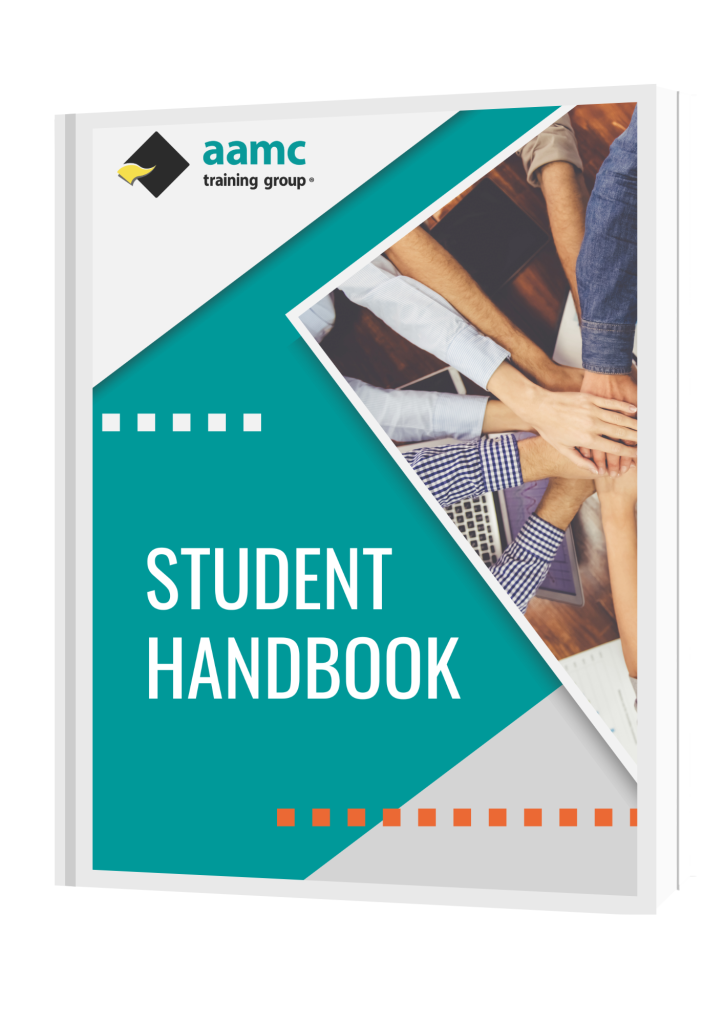Student Support & Resources
Student Resources
Unlock a wealth of resources and assistance designed to support you throughout your learning experience.
From academic guidance to technical support, we’re here to ensure your success.

Please note that our office will be closed from 5:00 PM AEDT on Wednesday 24th December 2025,
and reopen at 8:30 AM AEDT on Monday 5th January 2026.
During this period, our student support services will be limited.
Website chat functions and enquiry forms will remain accessible, and you may lodge a Help Request through your learner portal.
Welcome to AAMC Training, your ultimate source for essential information

Our dedicated Course Consultants and Training Support Team are available to provide detailed assistance.
AAMC Training staff will make every reasonable effort to support students in achieving a successful outcome. Additional training or tutorials may be arranged; please note that some options may incur extra costs.
Throughout the course, students receive support from administration staff, trainers and assessors. Assistance is available through various channels, including the help request function and virtual classrooms.
Assessors can help with questions related to subject matter, concepts, practical applications, and course topics where practicable. However, we encourage students to engage thoroughly with the course materials before seeking assessor support.
Please note trainers cannot provide answers to assessments or review draft submissions.
For the most effective assistance, submit your questions via a Help Request from your learner portal.
Alternatively, contact us at 1300 226 233 or via email at [email protected].
Additional Learning Support
We’re committed to helping you succeed. If you have any questions or would like to take advantage of the support options below, please get in touch — we’re here for you.
- Need a quick response? – Reach out to our team via our Help Request function in your Learner Portal.
- Complimentary Assessment Support – join 1 hour group sessions with a trainer, help to understand tasks, planning your time, and accessing trainer feedback.
- Upgrade to Virtual Classroom Sessions – spend time with a qualified trainer who will guide you through the learning resources, help you understand your assessments and assessor feedback. Contact our team to enquire about sessions.
- Already a Virtual Class Student? – Reattend any upcoming sessions for free during your enrolment period. Just let our team know you’d like to join again.
Support for Learning Difficulties
Common learning difficulties:
- Dyslexia: Challenges with reading, spelling, and understanding written language.
- Dyscalculia: Difficulties with numbers and mathematical concepts.
- Dysgraphia: Problems with writing, especially handwriting and organizing thoughts on paper.
- ADHD (Attention Deficit Hyperactivity Disorder)
Getting assistance with learning difficulties or disorders
The Australian Federation of SPELD Associations (Auspeld) represents all state and territory SPELD (Specific Learning Disorders) Associations. These organisations promote effective literacy and numeracy instruction for all learners through the provision of a range of in-demand services, including professional development for educators, access to support and advice, and more.
Use this link to their website to find SPELD assistance near you: https://auspeld.org.au/about/
General Health and Wellbeing
Student Wellbeing hub
Provides age-appropriate information and resources to support student wellbeing and safety
(No phone number listed)
https://studentwellbeinghub.edu.au
ASK Wellbeing
Offers student wellbeing services through the National Student Wellbeing Program in NSW and QLD
1300 513 088
https://askwellbeing.au
Counselling & Personal Support
Students who require extra support or counselling are encouraged to make contact with a member of our team for assistance. If we are not able to assist we may refer the student to appropriate support services, some are listed below.
Support lines
- Lifeline – 13 11 14
- Relationships Australia – 1300 364 277

- MensLine Australia – (For men of any age) 1300 78 99 78
- Kids Helpline – (For those aged 5-25) – 1800 551 800
 (Free call)
(Free call)
Mental Health Websites
Launched as part of the Australian Government’s National E-Mental Health Strategy, this site is a trusted gateway to issues surrounding mental health care and a first step to finding relevant support and resources to meet mental health needs.
Beyond Blue’s work is aimed at achieving an Australian community that understands depression and anxiety, empowering all Australians, at any life-stage, to seek help.
Anxiety Online provides information, assessment, referral and treatment for Panic Disorder, Social Anxiety Disorder, Generalised Anxiety Disorder, Obsessive Compulsive Disorder and Post-Traumatic Stress Disorder.
Headspace provides mental and health wellbeing support, information and services to young people aged 12 to 25 years and their families.
ReachOut.com is Australia’s leading online youth mental health service. It’s a perfect place to start if not sure where to look. It’s got information on everything from finding motivation, through to getting through really tough times.
Jean Hailes’ vision is physical and emotional health and wellbeing in all its dimensions for all Australian women throughout their lives.
Culturally Inclusive Support
Referral list to culturally appropriate organisations
QLife
Support for LGBTQIA+ students, including peer support via phone and webchat
1800 184 527
www.qlife.org.au
Multicultural Australia
Supports culturally and linguistically diverse communities through culturally safe, respectful, and inclusive services.
07 3337 5400
https://www.multiculturalaustralia.org.au
13YARN
24/7 crisis support by Aboriginal and Torres Strait Islander people for Indigenous Australians
13 92 76
https://www.13yarn.org.au
Youth Off The Streets – First Nations Cultural Support Services
Offers culturally appropriate referrals and support services for First Nations young people.
02 9330 3500
https://youthoffthestreets.com.au/get-support/cultural-support
Financial Support and Fee Transparency
AAMC Training Group provides clear and accurate information about all course fees in our Terms & Conditions before you enrol. Course fees are payable in full at enrolment. In limited cases, a two-part payment arrangement may be approved before commencement.
Your tuition fees are protected under our Refund and Fee Protection Policy, and refunds are processed in accordance with the ASQA Standards for RTOs 2025 and Australian Consumer Law.
If you experience financial hardship, our Student Support Team can assist with confidential advice and referral to financial counselling services such as:
Reasonable Adjustment
Trainers/assessors are permitted to make any modification to the learning environment, certification requirements, training delivery or assessment method used to help students with disability to access and participate in education and training on the same basis as those without disability.
AAMC Training are obliged by law to make reasonable adjustment to support maximum participation of students who have a learning disability. This includes;
- ensuring that course activities are sufficiently flexible;
- providing additional support where necessary; and
- offering a reasonable substitute within the context of the course where a student cannot participate.
AAMC Training will make every reasonable effort to ensure that it can accommodate a student’s needs. However, sometimes those needs are beyond the assistance that can reasonably be provided by AAMC Training (for the purposes of LLN assistance, “reasonable allowance” is defined as the provider being able to accommodate the student’s needs without significantly disadvantaging other student’s involvement in the course, or without causing the training provider significant financial disadvantage).
Download our Student Handbook
Frequently Asked Questions
When can I contact someone?
Our office hours are from:
8.30 AM to 7:00 PM, Monday to Friday AEST
8:30 AM to 8:00 PM, Monday to Friday ADST (Daylight Savings)
Our team aims to respond to help requests and emails within 24 hours.
How do I apply for Credit Transfer?
You can apply for Credit Transfer during enrolment by uploading your USI transcript OR record of results/testamur AND privacy disclosure form, OR after enrolment by submitting an online ‘help request’ via the learner portal and attaching supporting evidence.
For more information, see our Credit Transfer page
What is Recognition of Prior Learning?
Recognition of Prior Learning (RPL) is a process that evaluates the competency of an individual based on their vocational experience and knowledge and whether they meet the requirements of the course. A qualified AAMC Training assessor will determine whether the information provided supports the unit of competence requirements and if there is a need for any gap assessment. A gap assessment is a formal assessment to extract missing or further required knowledge from an RPL student. To find out further information on the RPL Requirements for a particular course, go to the RPL Pathway page.
Is this course accepted by industry associations?
All of our qualification courses are both nationally recognised by the FBAA and MFAA.
What are CPD hours?
Continual Professional Development (CPD) provides each individual with a framework within which they must take responsibility for their own learning. A number of associations have CPD programs in place and the CPD has become a legal requirement in many sectors of the finance industry. Hours are awarded for each activity and these hours are set by the relevant associations or the regulatory bodies pertaining to the relevant profession.

